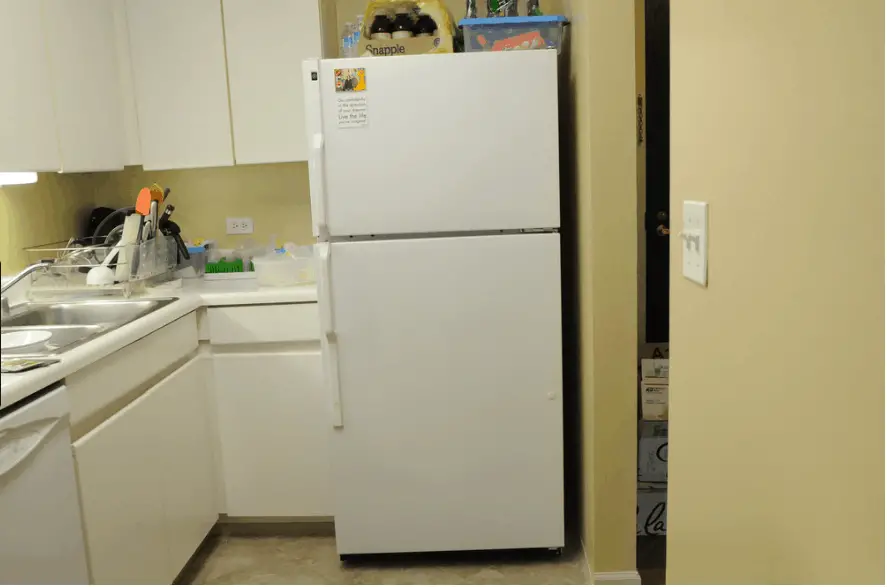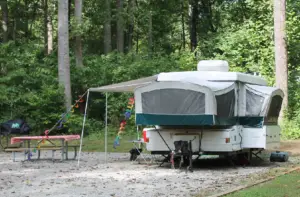RV refrigerators are different in comparison to the refrigerators what you use at home. Their functioning and design is different.
RV refrigerators are basically absorption type and they do not use compressor like standard residential refrigerators. They use evaporation and condensation for cooling the food.
RV’s come equipped with refrigerators that are heavier, smaller and may not be like your residential refrigerator.
So, can you get the RV refrigerator removed and put a residential one instead?
Lets find out in detail.
An RV refrigerator can be replaced with a residential refrigerator but it will need a dedicated 110 V power plug arrangement which may not be existing already. In addition, it cannot operate on propane or 12V DC battery power, which means one cannot use it in absence of shore power or generator.
Residential refrigerator however gives larger internal storage. They are not level sensitive, provide more precision in temperature control, have more modern features and are affordable as well.
Inability to run on propane or 12V DC battery makes boondocking a little hard with them. Having an inverter that converts 12V DC to AC supply can however make it operational on 12V DC, but this is not an ideal solution.
Installing residential refrigerator in RV needs few considerations. A dedicated 110V power plug is needed but this may put additional load on the power. Its door opening side, size (height, width) should also match. Residential refrigerator should also be secured properly else you may face issues with door opening and vibrations.
RV refrigerators can be two way powered or even three way powered. What it means is, a 2-way powered refrigerator will normally work on 110 V electricity but if the electricity is unavailable then it will switch to propane. In three way power, along with 110 V power and propane, it can also use the 12V DC power that comes from the batteries in the rv.
Factors to consider
Here are all the factors you should consider before replacing the refrigerator.
Size
The first and the foremost factor is the size of the residential refrigerators. Depending on how big your RV is your original refrigerators will accommodated inside. And, if the space isn’t big enough then getting a new residential refrigerator could be an issue.
Read : How long can RV refrigerator run on battery?
Door Opening Side
Its not only about width, height but also the opening of door. The door should open the same side as the original RV refrigerator.
A residential refrigerator will be bigger and will normally need larger space.
Installation
You will need a 110V plug for connecting the standard refrigerator to power which may not be there already.
Also, Securing the residential refrigerators inside RV is critical, as the RV will be moving and you don’t want the refrigerator to malfunction while driving.
Check out: how you can keep your RV refrigerator cool while driving.
Installing the Residential refrigerator
RV refrigerators removal is not as easy as it is for home refrigerators because they are fixed and firmly mounted in the RV.
Also, since they are normally two way or three way powered, dismounting it would mean, you not only have to deal with electrical connections but also propane connection which can be dangerous if you are not familiar with the connections.
Also, following general steps to remove RV refrigerator may not work as different brands, models will not have identical mounting.
Thus, refrigerator removal procedure will vary. Considering the way RV refrigerator mounting is, its better to do this with the help of professional.
If at all it has to removed by yourself then make sure you unplug the power to fridge, turn off main battery. Make sure you turn off the main propane tank connection to rv refrigerator.
Once the RV refrigerator is removed you can install the residential refrigerator as per instruction on the manual.
Follow below steps for installing the refrigerator.
Step 1 – Measure the space
Before you decide on replacing the refrigerator make sure you know the exact dimensions of the already occupied RV fridge. The new residential fridge should fit in that exact space. So, before you start the hunt for that new standard refrigerator just be sure about the dimension.
Step 2 – Get the old one out
Once you shop the residential refrigerator its time to pull the old one out. As we saw, its important to disconnect the fridge with proper procedure. This is very important specially when the propane is involved. Disconnect all the connection and then get it out. Getting out a big RV refrigerator that comes built in can be hard. Decide on how much space it will need and accordingly you may need to remove some window assembly as well, if the door isn’t big enough.
Step 3 – Install 110 V plug connection
As we saw, the residential refrigerator will need dedicated 110 V power plug connection. If the connection is not available then install a new plug. This will need consideration in terms of power load. So, be sure to check with technician on the feasibility before you install the new plug.
Step 4 – Get the new one in the same location
Install the refrigerator and connect the 110 V power plug to the fridge. Make sure the door opens in the same direction as otherwise this can result in space issues.
Pros and Cons
If one wants a consistent cooling in a refrigerator then a residential refrigerator is the way to go. An RV refrigerator is costly but a residential type refrigerator lasts longer than the RV refrigerator.
Lets see basic differences between the residential refrigerator and the RV refrigerator. These differences perhaps will help you in deciding what type of refrigerator is best for you.
Ultimately it will help in deciding whether you should go for replacing your RV refrigerator with the residential refrigerator.
Here are few considerations before going for residential refrigerator in your RV. These are basically advantages and disadvantages of RV and residential refrigerators.
1. Power
A RV refrigerator can be two way powered or three way powered however your residential refrigerator will work on the 110 V electrical supply. When plugged onto electrical supply at campground you will be better off with residential type refrigerator.
But when you are not plugged you can use 12 V to 120 V inverter but then again a residential type refrigerator would ideally need a pure sine wave inverter else there will be power loss.
Residential refrigerators would need more power and if you are using inverter then you will loose battery faster. Thus, for residential refrigerator you may have to upgrade your batteries.
RV refrigerators are more of adaptive as they are specially built for travel and hence with two way and three way power you can be better off as far as power usage factor is concerned. Check out my other article on how much energy RV generators consume on an average.
Read : How many watts do RV Air Conditioner consume
2. Size and Capacity
RV’s are designed to accommodate compact appliances and thus, a refrigerator also need to be smaller in size. A class A RV or a fifth wheel will be bigger but not a normal sized travel trailer or tent trailer. Not all will be able to live well with smaller sized refrigerators.
RV refrigerators are compact and smaller in size, their capacity is also limited to some extent. Where as, if you plan to replace it with residential it will give you bigger size and capacity. Replacing a RV refrigerator with residential will also need a quick check if your RV doors are big enough to fit the residential fridge inside.
A bigger sized refrigerator would also mean it will have more weight. And thus, you need to do the calculations so that you are not going against the Gross vehicle weight ratio abbreviated as GVWR. A high RV weight also means you are bringing down the mileage.
3. Efficiency
A RV refrigerator specially manufactured considering the space limitations, power consumption may not be as efficient as the normal residential refrigerator. Specially in hot climate which is humid and at higher altitudes.
They may also take long times to cool and keep food consistently cold. For better operations it is also recommended that the rv fridge be defrosted once in month or two.
This again will mean extra work and power consumption. Residential refrigerators are very good at maintaining temperatures consistently and more efficient as compared to RV refrigerators.
4. Maintenance
The RV refrigerators that come in fitted within normally need more maintenance . Not doing so can hamper the efficiency further. Residential refrigerators as you may have experienced at home needs less maintenance.
And they also have better performance in comparison to RV fridges. With RV refrigerators you will also need to consider about outside ambient temperatures.
With RV refrigerators you need to be more careful while parking your RV. Uneven parking may damage the refrigerator. Also need to make sure internal air flow is regulated so the RV refrigerator can keep food cold.
5. Manufacturing and sustainability
Residential refrigerators are made up of light and soft material like aluminum, brass and copper. They are in first place made for home purpose and are not designed to withstand vibrations and bumps.
And thus, vibrations on RV may not be good for residential refrigerators. RV refrigerators are built strong with steel which can withstand vibrations and last longer.
With advances in RV manufacturing that makes stronger chassis and suspension designs, residential refrigerators can be good match to RV refrigerators in terms of life in RV.
RV Refrigerators do last long, but few things can bring down those years.
6. Airflow
A residential refrigerator needs good air flow and with out this it may not be working under ideal conditions. A compact RV with very little space for appliances will make it difficult for air flow.
A RV refrigerator on the other hand is based on absorption mechanism that does not need compressor. And hence air flow isn’t relevant in that case.
7. Power Off issue
Keeping residential refrigerator off may not be good. A RV refrigerator is designed to work for such situations. You can keep them off for weeks and then use without any issues. You know what happens to a home refrigerator if its kept off for weeks.
Sure you can keep the RV refrigerator running all time but you need to be sure of few things, check it out in the linked article
RV residential refrigerator door lock
When a rv refrigerator is replaced with the residential one you may face issue if its not properly mounted or vibrations in the rv may cause issue. When this is the case you may want to makes sure the fridge doors be closed firmly and securely.
- You can use L brackets at each front corners. Can also use window latches for securing the refrigerator door.
- Make use of plastic cabinet child locks for locking the doors.
Deciding On RV refrigerator replacement
Refrigerators are important part of our daily life and not many would live without refrigerators. Specially, when it comes to rving one can hardly live without it. A refrigerator if at all has to be replaced in a rv then one has to be careful enough to consider all factors.
You need to check your family needs. What are the things you care most when it comes to refrigeration, what things you can live without and adjust.
These all factors along with the pros and cons of other options should help you decide whether you really want to replace the rv refrigerator or not. A RV mostly will have a Narcold or a Dometic refrigerator. There can be others as well, but these are most common and popular ones.
People who go solo rving are good with those refrigerators but a family would definitely need something that can carry a lot of food. Also, cooling in a rv refrigerator may not be as good as residential refrigerator and hence this makes a lot of difference.
When you are using basic rv refrigerator you have to live its drawbacks and limitations. If you feel an urge of changing the rv refrigerator then you would want to consider all possible options, compare the options with your needs and then finalize the replacement.
Replacing a RV refrigerator with a residential type of refrigerator is a good option however will need some careful considerations.
Conclusion
RV refrigerators can be properly mounted, occupying less space. Residential refrigerators can give you home feeling as it has higher capacity. Residential refrigerators needs careful considerations related to power, space, weight and life span. Compare all the pros and cons of residential refrigerators mentioned above. Do a proper check, research, calculate and then only decide on replacing your RV refrigerator with residential one.





